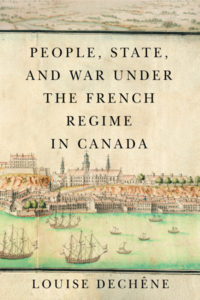Louise Dechêne. People, State, and War Under the French Regime in Canada. McGill-Queens University Press, 2021. 595 pages, paperback $44.95 CDN, ISBN: 978-0-2280-0677-0.
by Joshua Shepherd
 Early Canada has generally been viewed as a robust frontier society: peopled by hardy back-country traders and defended by an aggressive militia skilled in the field-craft of the colonial borderlands. In the book People, State, and War Under the French Regime in Canada, author Louise Dechêne endeavors to present a more balanced view of the early French colony.
Early Canada has generally been viewed as a robust frontier society: peopled by hardy back-country traders and defended by an aggressive militia skilled in the field-craft of the colonial borderlands. In the book People, State, and War Under the French Regime in Canada, author Louise Dechêne endeavors to present a more balanced view of the early French colony.
The author frames a chronological study of the Canadian people, from the earliest conflicts with the Iroquois people of New York to the final British conquest of the province at the close of the Seven Year’s War. It was a period of intermittent warfare, drastically increasing in intensity during the middle third of the eighteenth century.
Far from viewing the early Canadians as a fiercely independent warrior class restive of French rule, Dechêne frames the colonists as decidedly loyal to the Bourbon monarchy. Although class distinctions loomed large in nearly every aspect of life in the seventeenth and eighteenth centuries, Dechêne’s early Canadian settler retains a distinctly French character. For the author, the concept of a strictly Canadian “national” identity is a curious creation of later historians.
Relying heavily on primary sources including diaries, official correspondence, and military reports, the author pens a painful view of a society at war. Compulsory military service, paired with recurrent disruptions to agriculture and trade, hampered economic development and familial relations in the nascent colony.
Despite the exception of the free-wheeling coureur de bois, Dechêne’s contention is that the early French colonists, taken as a whole, were steeped in centuries of monarchist absolutism and Roman Catholic tradition. By her reckoning, the average habitant, although largely submissive to structured hierarchies, was naturally reluctant to go to war. The author consequently highlights the conspicuous role that tribal allies bore in the defense of the colony, a heavy burden that far exceeded the capacity and willingness of Canadian farmers and merchants.
Dechêne, who unfortunately passed before the 2008 publication of her work, was clearly concerned that commonly-held assumptions regarding the nature of early Canadian society were not grounded in a balanced reading of primary sources. In this work, she endeavored to rectify the perceived misconceptions, as well as highlight the plight of Canadian civilians tragically caught in an epic war for empire.
Louise Dechêne’s landmark study People, State, and War Under the French Regime in Canada is a crucial contribution to the historiography of early Canadian history. Originally published in French in 2008, the volume is more readily accessible to a wider audience in an English language paperback edition from McGill-Queen’s University Press.
In addition to extensive endnotes supporting the text, the book includes two lengthy appendices – “military movements” – that chronicle French expeditions known to have taken place between 1666 and 1760. The appendices offer an intriguing look at the physical makeup of each expedition, specifying the number of militia, regulars, and tribal allies known to have participated.
For professional academics who specialize in the field of early North American studies, the volume is certainly a must-read. Although by no means a work of popular history with wide appeal, the book nonetheless affords avocational history enthusiasts a fascinating glimpse of early Canada.
Joshua Shepherd, a sculptor and independent researcher, has created over 30 public monuments. His articles, with a special focus on Revolutionary and frontier America, have appeared in publications including MHQ: The Quarterly Journal of Military History, Military Heritage, Journal of the American Revolution, and Civil War Quarterly.







